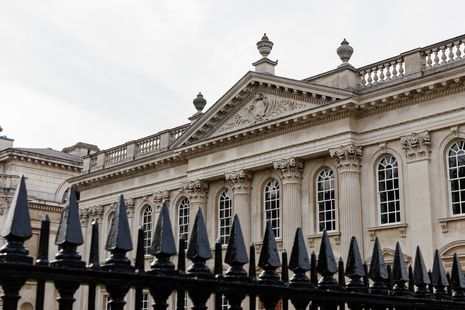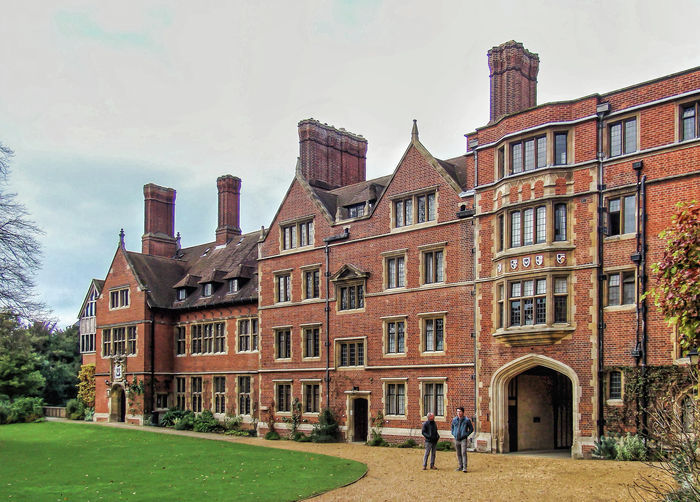All we are asking for is to feel safe
Chloe Newbold argues that Cambridge has continually has failed to protect members of the university from sexual violence and that the system needs to do more to educate on this issue, and centre student welfare at the heart of the university experience

Content Note: This article contains discussion of sexual violence. A list of support and resources can be found at the bottom of the article.
This has been the year that I stopped feeling safe on campus.
It’s hard to explain the all-pervading discomfort I experience as a victim of sexual misconduct in my everyday life at this University: sitting in lecture halls that have been open to misogynistic rape apologists such as Justice for Men and Boys (otherwise known as ‘J4MB’, who have shared posts including ‘13 reasons why women lie about being raped’ and a video ‘The glorius rise of men who won’t date feminists’ on their website); borrowing books from my departmental library after receiving an email calling for silence on the accusation of sexual assault against a faculty member; opening my reading lists and lecture notes without any prior knowledge of the potentially triggering content I could find inside.
Over the past five years, there have been some positive steps taken within Cambridge, such as the introduction of a Sexual Assault and Harassment Advisor at UCS, Amy O’Leary, and an ‘Investigating Officer’ role in University complains proceedings with experience of the complexities of sexual misconduct. However, The University of Cambridge – and many of its colleges – have proven on numerous occasions that they do not prioritise the welfare of victims. Throughout my three years at Cambridge, I have witnessed in the student press a continuous cycle of discontent at the failings of the University to adequately investigate and act on reports of sexual misconduct. The recent Tortoise investigation into the handling of allegations at Trinity Hall isn’t an isolated event, but is part of a longer narrative that has seen the institutionally embedded cynicism and suspicion with which victims are treated.
An email received by myself and other students within the History faculty last week asked students to respect the rights of the accused Dr O’Reilly to his privacy. The only concern for victims was found in a few links to support websites added to the bottom of the email – a mere afterthought. This email at once communicated a lack of attention to student welfare and sent a wider message that we will not be taken seriously when making the difficult decision to report instances of inappropriate behaviour.
“Cambridge has consistently dragged its feet when it comes to supporting the voices of those brave enough to report instances of sexual misconduct.”
Despite years of campaigning by student activists, and in particular by the CUSU Women’s Campaign, Cambridge is still unwilling to commit to truly breaking the silence. The University was willing to accept praise for the decision of Regent House to reform the Disciplinary Procedure standards of proof to “the balance of probabilities” last July, forgetting their years of inaction on calls for change. While this may have been a hard-fought victory for student campaigners, within the wider context of higher education, this was Cambridge taking a step which had been made years ago by most other British higher education institutions.
Cambridge has consistently dragged its feet when it comes to supporting the voices of those brave enough to report instances of sexual misconduct. This made it shocking – but hardly surprising – when it emerged months later that, due to reforms in the definition of ‘harassment’ planned to take place in October, that any sexual assault prior to this date would not be subject to investigation. Again, Cambridge seemed unwilling to listen.
It is difficult to explain the personal trauma associated with an act of sexual assault, a feeling that you do not belong in your body, a permanent sense of threat that can be difficult to shake. It’s a feeling that can return frequently, even in the absence of any immediate danger or physical threat. This feeling returned for many of us last year when we discovered that the University was allowing an event to be held by a so-called men’s rights group entitled ‘Justice for Men and Boys’ on University property. Failing to listen to us wasn’t enough, they were now providing a platform to a group that openly expressed contempt and ridicule toward women and non-binary people that had suffered sexual assault.
“...this University must take fundamental and radical steps to regain the trust of it’s students and many staff members.”
Nothing was more symbolic of the University’s attitude than standing outside with my fellow protestors while this group of vile rape apologists were sat warmly inside Mill Lane lecture halls. In that moment, campus became for me what I am sure it had become for many other victims: a place where I no longer felt safe.
But this sense of insecurity stems not merely from the failure of our institutions, but it is embedded within a wider culture that enables sexual violations. Coming to University having already experienced the dark side of sexual violence, I was shocked to find that ‘consent’ was an issue squeezed into a 60 minute session in Fresher’s Week. The only other times that I would hear this word uttered would be in the student press or in online support groups following from incidents of sexual assault. Nobody seemed to be aware of how the complaints procedures worked within each college, reflecting a culture of passivity that acted as if sexual misconduct was not an issue within our University.
Refusal to acknowledge these issues is also predominant in our lecture content. At points during my second year of study, the everyday act of opening a book or attending a lecture became an uncomfortable – and often traumatic – experience. Most departmental reading lists and lectures fail to include content warnings for potentially triggering themes, meaning that, as students, we may be forced to listen to content related to sexual violence and misogyny that can bring up past memories.
In an environment so heavily focused on academic excellence, the entrance of this insecurity into my working life became almost unmanageable. Instead of providing us with adequate notice, we are expected to sit in silence in lecture halls and libraries, surrounded by people, and attempt to hold back our tears.
No voice can speak for the numerous students that have been negatively impacted by recent events on campus; we all process trauma, often in extremely complex and personal ways. But one thing that we can all agree on is that this University must take fundamental and radical steps to regain the trust of it’s students and many staff members.
Senior members of the University, college’s and department that have treated victims with cynicism and disregard owe an apology to those that have taken the brave step to speak up about their experiences. Whilst the ‘Breaking the Silence’ campaign signifies a zero tolerance, it should be reiterated clearly and publicly that there is zero tolerance for sexual misdemeanours on campus, no matter the identity of the victim or the perpetrator, and the actions of the University must match this. Platforms must not be offered to groups that actively disregard the rights of victims. Consent education must be an ongoing process that is built into the very foundation of our academic institutions, incorporated in a fashion that enables honest discussions while protecting the welfare of students.
All we are asking for is to feel safe.
If you are affected by any of the issues raised in this article, the following organisations provide support and resources:
- Breaking the Silence: the University’s campaign against harassment and sexual misconduct (includes reporting mechanisms).
- Sexual Assault and Harassment Adviser: specialist University support worker who provides emotional and practical support
- Cambridge for Consent: a student-run campaign to promote consent.
- Cambridge Rape Crisis Centre: a charity for female victims of sexual violence.
- Cambridge Nightline: a confidential night-time listening service.
- Students’ Unions’ Advice Service: the Students’ Unions’ confidential, independent and impartial advice service.
 News / Reform candidate retracts claim of being Cambridge alum 26 January 2026
News / Reform candidate retracts claim of being Cambridge alum 26 January 2026 News / Report suggests Cambridge the hardest place to get a first in the country23 January 2026
News / Report suggests Cambridge the hardest place to get a first in the country23 January 2026 Interviews / Lord Leggatt on becoming a Supreme Court Justice21 January 2026
Interviews / Lord Leggatt on becoming a Supreme Court Justice21 January 2026 Comment / How Cambridge Made Me Lose My Faith26 January 2026
Comment / How Cambridge Made Me Lose My Faith26 January 2026 News / Cambridge psychologist to co-lead study on the impact of social media on adolescent mental health26 January 2026
News / Cambridge psychologist to co-lead study on the impact of social media on adolescent mental health26 January 2026









